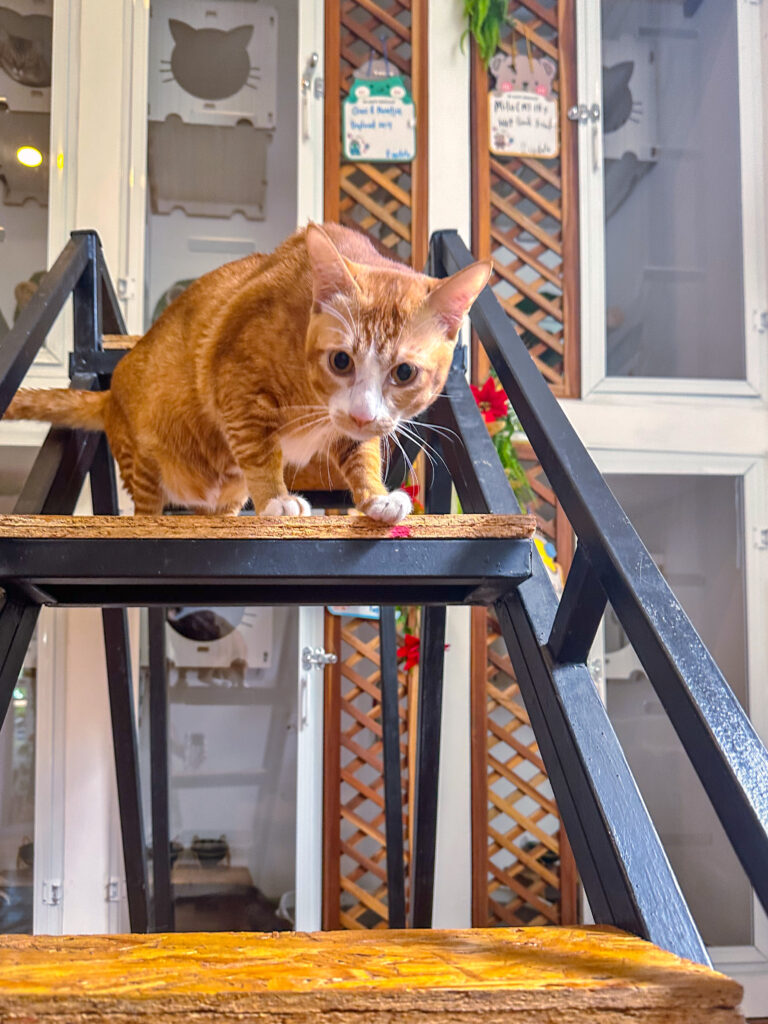Understanding and addressing cat behavior change is essential for cat owners and especially important in settings like a cat hotel in Thailand. Changes in a cat’s behavior can be subtle or overt, but they always convey a message.
Recognizing these changes, understanding their causes, and knowing when to seek help are key to maintaining a happy and healthy environment for your feline friends.
Recognizing Signs of Cat Behavior Change
Behavior change in cats can manifest in various ways. Some common signs include:
- Changes in appetite or water consumption
- Alterations in grooming habits, either grooming less or over-grooming
- Shifts in social behavior, such as increased aggression or withdrawal
- Variations in vocalization patterns
- Differences in litter box usage, including accidents outside the box
Male vs. Female Cat Behavior Change
Both male and female cats can exhibit behavior shifts, but sometimes the triggers differ:
- Male cat behavior change may show up as spraying, increased aggression, or restlessness, often linked to hormones or territory.
- Female cat behavior change can be influenced by heat cycles, pregnancy, or stress in multi-cat households.
Understanding these distinctions helps owners respond appropriately.
Cat Behavior Changes With Age
As cats grow older, their behavior may shift gradually:
- Senior cats may sleep more and play less
- Cognitive dysfunction can cause disorientation or anxiety
- Arthritis and mobility issues can lead to irritability or litter box accidents
Recognizing that cat behavior changes with age helps owners adapt care routines to keep senior cats comfortable.
Cat Behaviors to Worry About
While not every behavior change is alarming, some require urgent attention:
- Sudden aggression or hiding
- Rapid weight loss or gain
- Over-grooming until bald patches appear
- Refusing food or water
- Excessive vocalization
If you notice these cat behaviors to worry about, consult a veterinarian quickly.
Cat Behavior Change Psychology
Behavior shifts are not only physical — they can also be psychological. Anxiety, depression, and stress can manifest in cats just like in humans. Environmental stressors like moving house, a new pet, or changes in routine may trigger issues. Understanding cat behavior change psychology is key to solving underlying causes rather than just the symptoms.
My Cat’s Behavior Changed Overnight
If your cat suddenly acts differently overnight, it could be a sign of illness or injury. Painful conditions like urinary tract infections or dental disease often cause abrupt changes. Always seek veterinary advice when you notice your cat’s behavior changed overnight.
Cat Behavior Changes and Aggression
Aggression is one of the most noticeable (and concerning) changes. Causes include:
- Fear or stress
- Territory disputes with other cats
- Medical pain or discomfort
Managing cat behavior changes and aggression requires patience, veterinary checks, and sometimes professional feline behaviorist support.
Adapting Care Strategies in Cat Hotels for Behavioral Changes
In a cat hotel setting, adapting care strategies is crucial:
- Provide quiet and secure spaces for stressed cats
- Offer enrichment activities for bored or restless cats
- Monitor interactions to prevent conflicts
- Give medical-needs cats extra attention
At Lazy Cat Hotel & Spa in Phuket we emphasize on making your cat feel comfortable.
Preventing Cat Behavior Change
Prevention is always better than correction. Some key strategies:
- Keep a stable, low-stress environment
- Provide daily play and stimulation
- Schedule regular vet check-ups
- Pay attention to your cat’s cues and comfort levels
FAQ: Cat Behavior Change
Why has my cat’s behavior changed overnight?
Sudden shifts often indicate pain or illness. A vet check is the safest first step.
Do male and female cats behave differently?
Yes, male cats often show territorial spraying or aggression, while female cats may change behavior during heat cycles or pregnancy.
Can old age cause behavior changes in cats?
Absolutely. Senior cats can experience arthritis, cognitive decline, and altered routines that affect behavior.
When should I worry about cat behavior change?
If your cat stops eating, hides excessively, or becomes aggressive without clear reason, it’s time to seek professional help.







